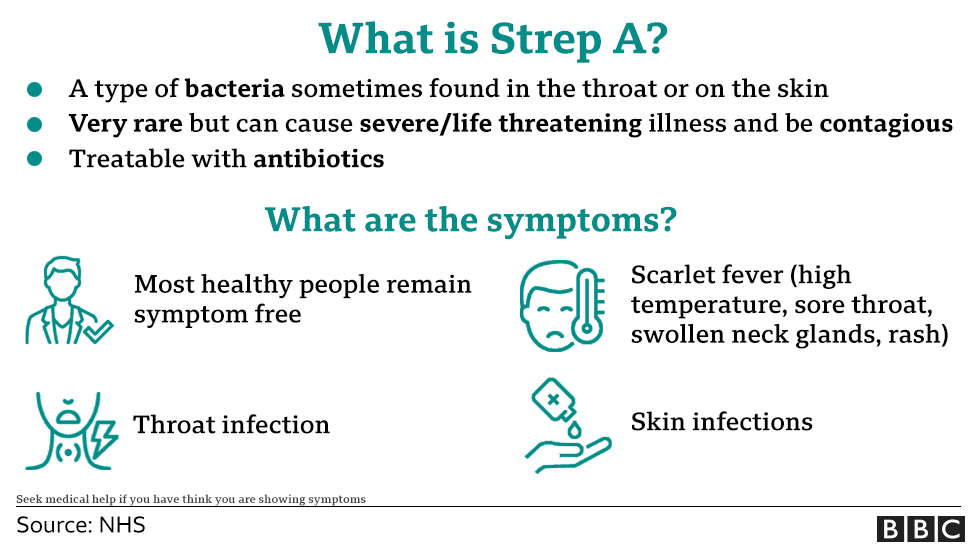Strep A: Family of Penarth girl Hanna Roap 'broken' by death
- Published

Hanna was a pupil at Victoria Primary School in Penarth, Vale of Glamorgan
The family of a girl who died from the bacterial disease Strep A have said their "hearts have been broken into a million pieces".
Hanna Roap, a primary school pupil from Penarth, Vale of Glamorgan, had invasive Group A Streptococcal disease (iGAS).
She is now one of six children to have died with Strep A, the UK Health Security Agency (UKHSA) has confirmed.
The others were in England, including in London, Buckinghamshire, and Surrey.
In a statement on Facebook Hanna's family said: "Thank you to everyone for your overwhelming support.
"Thank you for all the flowers, cards and donations. Thank you for all the hugs and tears. Your kindness reminds us that there is good despite immense tragedy.
"We are sorry we have not responded to any messages, texts, emails and calls. Sorry if we are unable to make eye contact if we see you walking by.
"Our hearts have been broken into a million pieces.
'Stunned by donations'
"Our only priority is the welfare of Hanna's eight-year-old sister and best friend.
"We have been stunned by the volume of donations we have received. We were not expecting this. This is testament to the wonderful caring people of Penarth. We will be donating all of this to charity.
"As most of you will be wondering what the cause of death was and to prevent misinformation, Hanna passed away as a result of contracting Strep A.
"It all happened suddenly (within 24 hours)."
Allow Facebook content?
This article contains content provided by Facebook. We ask for your permission before anything is loaded, as they may be using cookies and other technologies. You may want to read Meta’s Facebook cookie policy, external and privacy policy, external before accepting. To view this content choose ‘accept and continue’.
Hanna's death comes as Public Health Wales said it has written to schools and nurseries in Wales "to remind them of the symptoms and potential complications of scarlet fever more generally. This was prompted by a rise of case of scarlet fever across the UK".
PHW said there were 1,512 notifications of scarlet fever in the first 47 weeks of 2022, compared to 948 In the same period in 2019.
Numbers were lower across 2020 and 2021 likely due to changes in transmission and behaviour during this period, it said.
In a letter it said: "We are notifying schools and nurseries as this infection mostly affects children aged under 10 years, and so outbreaks can occur in schools and nurseries. Older children are also susceptible to streptococcal sore throats but may not have the rash of scarlet fever".

'Extremely rare'
Hanna was a pupil at Victoria Primary School. In a joint statement with the Vale of Glamorgan council, it said: "Earlier this week, it was confirmed that a pupil from Victoria Primary School had tragically passed away after contracting Strep A.
"Both the school and council would like to pass on their heartfelt condolences to the family at this incredibly difficult time.
"Support is being provided to staff and pupils by the council's team of educational psychologists and information from Public Health Wales has been circulated to parents where appropriate.
"It is unlikely that other pupils will be affected by the illness and severe symptoms are extremely rare.
"Sensible precautions such as regular hand washing and not attending school when ill can reduce the risk of infection."
Symptoms of Strep A include high fever, severe muscle aches, pain in one area of the body, redness at the site of a wound, vomiting or diarrhoea, a sore throat or tonsillitis, and a mild skin infection such as impetigo or a rash.
Anyone with any of these symptoms is advised to contact their GP immediately.
Dr Ardiana Gjini, from Public Health Wales, said it was working closely with the Penarth school to raise awareness about the disease.
"Although it is unlikely that their child will be affected by iGAS infection, relevant individuals are being advised that they should familiarise themselves with the symptoms and what to do if these symptoms occur," said Dr Gjini.
"Contracting iGAS disease from a contact is very rare."
- Published1 December 2022

- Published24 November 2022

- Published11 September 2019
